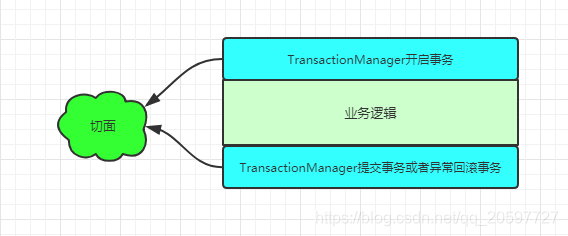@Transactional 注解是如何实现的?
@Transactional注解简介
spring中声明式事务实现原理猜想
@Transactional作用
@Override
public TransactionAttribute parseTransactionAnnotation(AnnotatedElement ae) {
//这里就是分析Method是否被@Transactional注解标注,有的话,不用说BeanFactoryTransactionAttributeSourceAdvisor适配当前bean,进行代理,并且注入切点
//BeanFactoryTransactionAttributeSourceAdvisor
AnnotationAttributes attributes = AnnotatedElementUtils.getMergedAnnotationAttributes(ae, Transactional.class);
if (attributes != null) {
return parseTransactionAnnotation(attributes);
}
else {
return null;
}
}
动态代理逻辑实现
@Override
public Object intercept(Object proxy, Method method, Object[] args, MethodProxy methodProxy) throws Throwable {
Object oldProxy = null;
boolean setProxyContext = false;
Class<?> targetClass = null;
Object target = null;
try {
if (this.advised.exposeProxy) {
// Make invocation available if necessary.
oldProxy = AopContext.setCurrentProxy(proxy);
setProxyContext = true;
}
// May be null. Get as late as possible to minimize the time we
// "own" the target, in case it comes from a pool...
target = getTarget();
if (target != null) {
targetClass = target.getClass();
}
//follow
List<Object> chain = this.advised.getInterceptorsAndDynamicInterceptionAdvice(method, targetClass);
Object retVal;
// Check whether we only have one InvokerInterceptor: that is,
// no real advice, but just reflective invocation of the target.
if (chain.isEmpty() && Modifier.isPublic(method.getModifiers())) {
// We can skip creating a MethodInvocation: just invoke the target directly.
// Note that the final invoker must be an InvokerInterceptor, so we know
// it does nothing but a reflective operation on the target, and no hot
// swapping or fancy proxying.
Object[] argsToUse = AopProxyUtils.adaptArgumentsIfNecessary(method, args);
retVal = methodProxy.invoke(target, argsToUse);
}
else {
// We need to create a method invocation...
retVal = new CglibMethodInvocation(proxy, target, method, args, targetClass, chain, methodProxy).proceed();
}
retVal = processReturnType(proxy, target, method, retVal);
return retVal;
}
finally {
if (target != null) {
releaseTarget(target);
}
if (setProxyContext) {
// Restore old proxy.
AopContext.setCurrentProxy(oldProxy);
}
}
}
TransactionInterceptor–最终事务管理者
@Override
public Object invoke(final MethodInvocation invocation) throws Throwable {
// Work out the target class: may be {@code null}.
// The TransactionAttributeSource should be passed the target class
// as well as the method, which may be from an interface.
Class<?> targetClass = (invocation.getThis() != null ? AopUtils.getTargetClass(invocation.getThis()) : null);
// Adapt to TransactionAspectSupport's invokeWithinTransaction...
return invokeWithinTransaction(invocation.getMethod(), targetClass, new InvocationCallback() {
@Override
public Object proceedWithInvocation() throws Throwable {
return invocation.proceed();
}
});
}
protected Object invokeWithinTransaction(Method method, Class<?> targetClass, final InvocationCallback invocation)
throws Throwable {
// If the transaction attribute is null, the method is non-transactional.
final TransactionAttribute txAttr = getTransactionAttributeSource().getTransactionAttribute(method, targetClass);
final PlatformTransactionManager tm = determineTransactionManager(txAttr);
final String joinpointIdentification = methodIdentification(method, targetClass);
if (txAttr == null || !(tm instanceof CallbackPreferringPlatformTransactionManager)) {
// Standard transaction demarcation with getTransaction and commit/rollback calls.
//开启事务
TransactionInfo txInfo = createTransactionIfNecessary(tm, txAttr, joinpointIdentification);
Object retVal = null;
try {
// This is an around advice: Invoke the next interceptor in the chain.
// This will normally result in a target object being invoked.
//方法调用
retVal = invocation.proceedWithInvocation();
}
catch (Throwable ex) {
// target invocation exception
//回滚事务
completeTransactionAfterThrowing(txInfo, ex);
throw ex;
}
finally {
cleanupTransactionInfo(txInfo);
}
//提交事务
commitTransactionAfterReturning(txInfo);
return retVal;
}
else {
// It's a CallbackPreferringPlatformTransactionManager: pass a TransactionCallback in.
try {
Object result = ((CallbackPreferringPlatformTransactionManager) tm).execute(txAttr,
new TransactionCallback<Object>() {
@Override
public Object doInTransaction(TransactionStatus status) {
TransactionInfo txInfo = prepareTransactionInfo(tm, txAttr, joinpointIdentification, status);
try {
return invocation.proceedWithInvocation();
}
catch (Throwable ex) {
if (txAttr.rollbackOn(ex)) {
// A RuntimeException: will lead to a rollback.
if (ex instanceof RuntimeException) {
throw (RuntimeException) ex;
}
else {
throw new ThrowableHolderException(ex);
}
}
else {
// A normal return value: will lead to a commit.
return new ThrowableHolder(ex);
}
}
finally {
cleanupTransactionInfo(txInfo);
}
}
});
// Check result: It might indicate a Throwable to rethrow.
if (result instanceof ThrowableHolder) {
throw ((ThrowableHolder) result).getThrowable();
}
else {
return result;
}
}
catch (ThrowableHolderException ex) {
throw ex.getCause();
}
}
}
总结
作者 | 一撸向北
来源 | csdn.net/qq_20597727/article/details/84868035

评论



